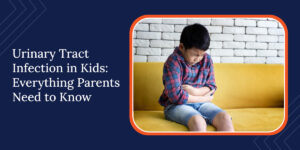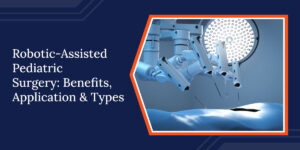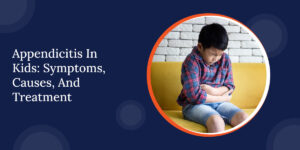Appendicitis is a medical emergency that needs to be addressed as soon as possible. It occurs when the appendix gets infected and inflamed. While it can happen to anyone at any age, children are at most risk of life-threatening complications. Hence, early and accurate diagnosis, along with proper treatment, is essential. Because the symptoms of the condition are similar to other minor problems, parents must be completely aware of what appendicitis looks like, its risks, and when to see the doctor.
In this blog, we will explain the symptoms, causes, diagnosis, and treatment options for appendicitis in kids. As a reputed paediatric surgeon in Dubai, we feel it is our duty to help parents and caregivers stay informed and prepared.
A] What is the Appendix?
The appendix is a small tube-like structure located near the large intestine and does not contribute much to the healthy functioning of the body. Experts suggest it has a very minor role in the digestion process and gut health, but the body can function perfectly alright without it. As it is closely attached to the large intestine, stools and undigested food can easily get blocked in it, leading to parasitic or bacterial infection. Such infections can lead to inflammation and risk of appendicitis.
Know the Signs of Appendicitis in Kids – Act Fast, Stay Safe!
B] Symptoms of Appendicitis in Kids
The early appendicitis symptoms in kids can vary from child to child. However, some symptoms are universal.
- The most common symptom of appendicitis is abdominal pain, often beginning around the belly button and shifting to the lower right side.
- Children will also experience loss of appetite along with abdominal pain.
- Some may also develop a high fever.
- The abdominal near the lower large intestine will be swollen.
- Some children experience nausea, vomiting, and loss of appetite in the early stages, while some experience it in the later stages.
- Diarrhea, constipation, or both can also be seen in some cases.
- Irritability, lethargy, or reluctance to move are some of the most common misdiagnosed symptoms of appendicitis in children.
- Significant increase in pain and irritation as time passes.
If you notice any of these symptoms, consult our clinic at the earliest possibility for a medical diagnosis.
C] What Causes Appendicitis in Kids?
When the appendix gets infected or blocked, it leads to inflammation, and the condition is called appendicitis. This infection or blockage can be caused by a number of factors, including hard stools, undigested food particles, hard mucus, bacteria, and even parasites. The appendix can also get inflamed by getting twisted with itself.
Genetics and environmental factors are the biggest causes of appendicitis. While it can affect anyone at any age, children and teenagers are often most affected by it. There are no specific precautions that you can take to prevent it, and the exact cause of appendicitis is not always known and is inconsequential to its treatment.
D] How Is Appendicitis Diagnosed in Kids?
If your child is experiencing any of the ruptured appendix symptoms mentioned above, you need to consult a paediatric surgeon as soon as possible for a professional diagnosis. At our clinic, we conduct multiple tests to confirm the condition and check its severity, including:
- Abdominal Ultrasound: Abdominal ultrasound is recommended if the child is experiencing severe abdominal pain near the lower right side of the belly button. This imaging test shows the internal organs and blood vessels as they work, helping to diagnose the condition effectively.
- CT Scan: A CT scan is an advanced imaging technique than an ordinary X-ray. Similar to ultrasound, a CT scan also helps to accurately diagnose the severity of the condition.
- Blood Tests: If the appendicitis is not treated in time, it can also interfere with the normal functioning of other abdominal organs, such as the liver and kidneys. A blood test helps to check for the health of other organs as well as the inflammation level.
- Urine Test: A urine test is used to determine the health and wellness of the kidneys and bladder. Infections in these organs have symptoms similar to appendicitis.
E] Treatment Options Available At Our Clinic
Our clinic is known for personalised and effective appendicitis treatment in Dubai for children. We consider the child’s age, symptoms, medical history, and the severity of the condition to tailor the treatment. The primary treatment of appendicitis is to surgically remove the appendix. If the condition is in its early stages, some patients can be given antibiotics to manage the inflammation.
There are two types of surgery that we offer at our clinic:
- Open Surgery: Open surgery is the traditional form of surgery where a large incision is made near the abdomen to find the appendix and remove it. The surgeon can clearly see the organs in the abdomen and move organs around to get to the appendix.
- Laparoscopic surgery: Laparoscopic surgery is a new form of surgery in which the incision made is much smaller. The doctor inserts a camera called a laparoscope and the surgical tools through these small incisions to remove the appendix. This surgery takes less time to heal and causes less tissue damage.
Know the Signs of Appendicitis in Kids – Act Fast, Stay Safe!
F] Potential Complications If Left Untreated
Once the bacteria and parasites in the appendix start to multiply, the appendix starts to get inflamed and swollen to protect itself. As the appendix for kids is generally smaller than for adults, the condition escalates very quickly in kids. Due to this, the blood flow to the appendix can also get cut off, leading to more swelling and even ruptures. Substances like stool and mucus can leak from this rupture, causing a serious infection called peritonitis. Hence, it is recommended that a paediatric surgeon be consulted as soon as possible.
Also Read: Benefits of Choosing a Paediatric Surgeon for Your Child
Conclusion
According to a report in 2021, 12.93% of all cases of appendicitis in the general population were in children. While it can affect people of any age, it severely affects children and teenagers. The risk of complications is often higher in children. If you notice symptoms like abdominal pain, swelling near the region, and loss of appetite, along with diarrhoea and constipation, you need to consult a paediatric urologist.
Dr. Bhushanrao Jadhav is a reputed and trusted paediatric doctor in Dubai. Book an appointment today to ensure your child’s health.

Dr. Bhushanrao Jadhav
Dr. Bhushanrao Jadhav is a highly skilled Pediatric Surgeon and Urologist specialising in minimally invasive and robotic surgeries for children. With advanced training from leading institutions in the UK, India and USA, he brings expertise in treating complex genitourinary conditions and neonatal surgical ailments. Driven by compassion and innovation, Dr. Jadhav has pioneered pediatric robotic surgery programs in Pune, India, ensuring world-class care tailored to children’s unique needs.





















